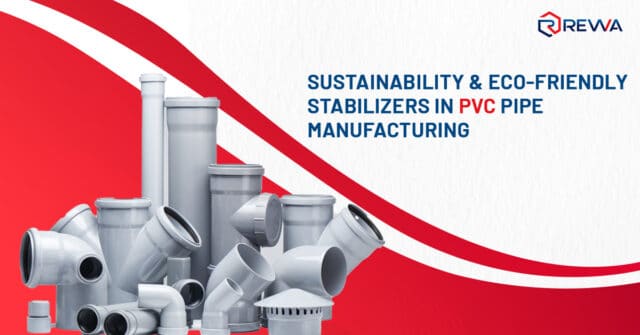
Polyvinyl chloride (PVC) is arguably one of the most versatile polymers for piping applications. However, traditional PVC compounding often involves the use of toxic stabilizers, which pose environmental and health risks. Sustainable eco-friendly additives have been critical considerations in various industries, including PVC processing
At Rewa Stabilizers & Lubricants Pvt. Ltd, we believe in a future where progress harmonizes with the environment. As a premier additive manufacturer, we understand the pivotal role our innovations play in shaping industries while preserving our planet.
In this blog, we delve into the realm of sustainability and how eco-friendly stabilizers are transforming PVC pipe manufacturing.
Types and Uses of PVC Pipe
PVC pipes are versatile and widely used in various applications. There are several types of PVC pipes designed to meet specific requirements in different industries.
Common types of PVC Pipes include PVC Sewer Pipes, PVC Pressure Pipes, PVC Electrical Conduit Pipes to name a few.
Uses of PVC Pipes
PVC (Polyvinyl Chloride) pipes are versatile and widely used in a variety of applications due to their durability and affordability.
Here are some common uses of PVC Pipes:
- Water Supply Lines
- Drainage and Sewer Systems
- Irrigation and Agriculture
- Electrical Conduits
- Underground Utilities
- Water Wells
The versatility of PVC materials and their adaptability to a wide range of applications make them an essential component in many industries and everyday life.
However, due to the use of lead-based stabilizers in manufacturing PVC, it has been linked to significant health concerns and environmental problems.
Embracing a greener path with sustainable stabilizers
Traditionally, PVC products manufacturing have been associated with environmental concerns due to the use of lead-based stabilizers.
However, the emergence of eco-friendly products marks a pivotal shift in the PVC processing industry.
Today, the demand for greener stabilizers has increased significantly. These stabilizers are designed to replace traditional stabilizers like lead, cadmium and phthalates for a more ecologically responsible approach to PVC processing.
They not only eliminate the harmful impact of traditional stabilizers on the environment but also ensure that the structural integrity of PVC fittings is maintained.
Calcium – Zinc Based Stabilizers
Lead-Free One Pack Stabilizers are Calcium/Zinc Based Additives. These additives, free from heavy metals, do not pose health risks and environmental issues associated with lead.
Calcium Zinc-based One Pack Stabilizers have gained popularity as eco-friendly stabilizer alternatives for PVC pipe manufacturing.
These stabilizers exhibit excellent thermal stability and weather resistance, resulting in PVC products with excellent long-term performance, even under harsh temperatures in outdoor environments.
Read more about Lead Free Stabilizers: What are Lead-Free One Pack Stabilizers for PVC Applications?
Recycled PVC
Recycling PVC reduces the demand for virgin PVC resin, reducing the environmental impact. Using recycled PVC in combination with lead-free stabilizers can create more sustainable pipes without compromising quality.
Process Optimization
Optimizing the PVC extrusion process to reduce energy consumption is a great way to achieve sustainability and eco-friendliness in PVC processing. Minimizing waste and enhancing recycling efforts within the manufacturing process can help reduce the environmental impact of PVC production.
Sustainable and Eco-friendly Stabilizers in PVC Pipe Manufacturing
Besides being eco-friendly in nature, PVC pipes manufactured using lead-free stabilizers are a preferred choice.
Advantages of PVC manufactured using lead-free stabilizers:
- Safer Water Supply System: The lead present in pipes is toxic even for human health. By removing the lead from the equation, PVC is safer to use in applications involving potable water.
- Longer lifespan of PVC Pipes: Calcium zinc-based stabilizers offer thermal and UV stability, ensuring the durability of PVC fittings. These lead-free stabilizers also enhance the weatherability of PVC pipes, translating to a longer life span and less need for frequent pipe replacements.
- Regulatory Compliance: The adoption of lead-free stabilizers aligns with environmental safety standards and establishes trust between manufacturer and end user.
Conclusion
In summary, lead-free calcium zinc-based stabilizers have proven to be suitable choices for PVC pipe manufacturing due to their environmental safety and superior quality. By embracing these eco-friendly stabilizers, we are not just creating greener products but also shaping a sustainable future for generations to come.
With Team Rewa, one of the best One Pack PVC Stabilizer Manufacturers of India, manufacturing according to India’s Go Green Policy, we have forayed our way into formulating and manufacturing non-toxic PVC Additives.
We offer technical consultation and trials to set the process for clients, supporting our goal of being sustainable by using non-toxic additives.
Ready to explore sustainable PVC solutions? Contact Us today!
FAQ
What are 2 environmental impacts of PVC?
The chlorine and harmful additives added during PVC manufacturing can have adverse effects on the environment. Also, improper disposal of PVC can lead to the release of toxic chemicals.
Is PVC-free eco-friendly?
PVC exhibits eco-friendly features such as durability, recyclability, and energy-efficient manufacturing. Nevertheless, the inclusion of toxic additives poses environmental risks. These concerns, however, can be effectively addressed by adopting lead-free, non-toxic additives in the PVC manufacturing process.
What is the sustainability of PVC pipes?
The sustainability of PVC pipes involves multiple aspects, such as durability, recyclability, energy-efficient manufacturing, lower greenhouse gas emissions and use of lead-free stabilizers instead of traditional toxic stabilizers.
What are sustainable alternatives for PVC?
Ceramics, HDPE, linoleum and copper are sustainable alternatives for PVC. Moreover, PVC manufactured using lead-free stabilizers is a sustainable alternative to PVC manufactured with traditional stabilizers.

